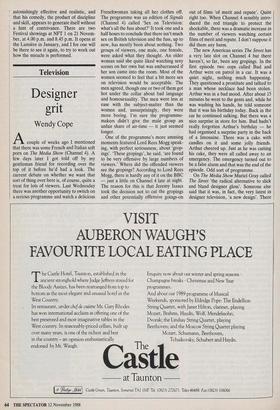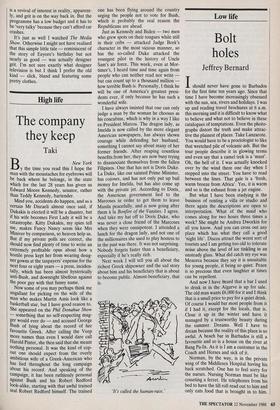Television
Designer grit
Wendy Cope
Acouple of weeks ago I mentioned that there was some French and Italian soft porn on The Media Show (Channel 4). A few days later I got told off by my gentleman friend for recording over the top of it before he'd had a look. The current debate on whether we want that sort of thing over here is, of course, quite a treat for lots of viewers. Last Wednesday there was another opportunity to switch on a serious programme and watch a delicious Frenchwoman taking all her clothes off. The programme was an edition of Signals (Channel 4) called 'Sex on Television: what's all the fuss about?' It took one and a half hours to conclude that there isn't much sex on British television and the fuss, up to now, has mostly been about nothing. Two groups of viewers, one male, one female, were asked what they thought. An older woman said she quite liked watching sexy scenes on her own but was embarrassed if her son came into the room. Most of the women seemed to feel that a bit more sex on television would be acceptable. The men agreed, though one or two of them got hot under the collar about bad language and homosexuality. The men were less at ease with the subject-matter than the women and, unsurprisingly, they were more boring. I'm sure the programme- makers didn't give the male group an unfair share of air-time — it just seemed longer.
One of the programme's more amusing moments featured Lord Rees Mogg speak- ing, with perfect seriousness, about `grop- ings'. 'These gropings', he said, 'are found to be very offensive by large numbers of viewers.' Where did the offended viewers see the gropings? According to Lord Rees Mogg, there is hardly any of it on the BBC — just a little on Channel 4 late at night. The reason for this is that Jeremy Isaacs took the decision not to cut the gropings and other potentially offensive goings-on out of films 'of merit and repute'. Quite right too. When Channel 4 sensibly intro- duced the red triangle to protect the shockable, there was a dramatic increase in the number of viewers watching certain films of merit and repute. I don't suppose it did them any harm.
The new American series The Street has a very late slot on Channel 4 but there haven't, so far, been any gropings. In the first episode two cops called Bud and Arthur were on patrol in a car. It was a quiet night, nothing much happening. They questioned a prostitute and talked to a man whose necklace had been stolen. Arthur was in a bad mood. After about 15 minutes he went to the gents and, while he was washing his hands, he told someone that it was his birthday today. Back in the car he continued sulking. But there was a nice surprise in store for him. Bud hadn't really forgotten Arthur's birthday — he had organised a surprise party in the back of a limousine. There was a cake with candles on it and some jolly friends. Arthur cheered up. Just as he was cutting his cake, they were all called away to an emergency. The emergency turned out to be a false alarm and that was the end of the episode. Odd sort of programme.
On The Media Show Muriel Gray called The Street 'the radical alternative to slick and bland designer gloss'. Someone else said that it was, in fact, the very latest in designer television, 'a new design'. There is a revival of interest in reality, apparent- ly, and grit is on the way back in. But the programme has a low budget and it has to be 'very talky' because they can't afford car crashes.
It's just as well I watched The Media Show. Otherwise I might not have realised that this simple little tale — reminiscent of the story of Eeyore's birthday but not nearly as good — was actually designer grit. I'm not sure exactly what designer television is but I think I prefer the old kind — slick, bland and featuring some pretty clothes.











































































 Previous page
Previous page